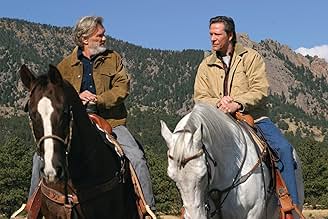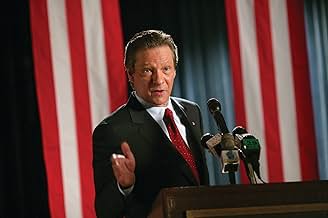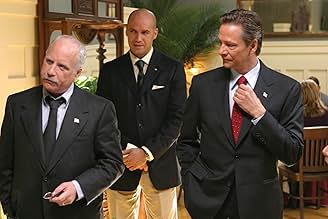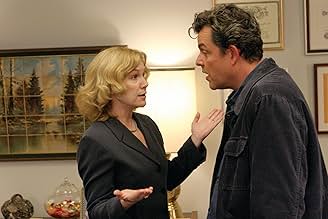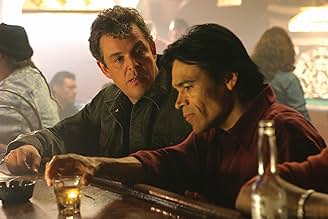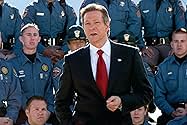Silver City
- 2004
- Tous publics
- 2h 8min
NOTE IMDb
6,0/10
4,3 k
MA NOTE
La découverte d'un cadavre menace de faire échouer la campagne maladroite d'un politicien local pour le poste de gouverneur du Colorado.La découverte d'un cadavre menace de faire échouer la campagne maladroite d'un politicien local pour le poste de gouverneur du Colorado.La découverte d'un cadavre menace de faire échouer la campagne maladroite d'un politicien local pour le poste de gouverneur du Colorado.
- Réalisation
- Scénario
- Casting principal
- Récompenses
- 1 victoire et 1 nomination au total
Avis à la une
You'll never look at "W" again without thinking of Dickie Pilager! Nice piece of political satire and all too true. Well shot...well acted... and well directed. The characters are slightly "comic bookish" but consider their real life counterparts.
Be sure to look at the "Additional features" on the DVD. It contains some very pointed social commentary from some very concerned and talented individuals. This movie is probably more important now that we have had the election outcome of 2004.
The Haskell Wexler cinematography is really excellent. Be sure to notice the backgrounds when he is interviewed!
Be sure to look at the "Additional features" on the DVD. It contains some very pointed social commentary from some very concerned and talented individuals. This movie is probably more important now that we have had the election outcome of 2004.
The Haskell Wexler cinematography is really excellent. Be sure to notice the backgrounds when he is interviewed!
I'm surprised at the opening negative reviews this film is receiving on the board. The suggestion this film is the worse Sayles had to offer gives his last couple films a better rating than they deserve -- the baby adoption one seemed unfinished and the one with the Florida (?) resort building was a bit bland to say the least. It is quite true that Silver City does not meet the standards of "Lone Star" and other great Sayles films -- he has gone into a bit of a slump. Still, this film suggests we might hope he is climbing out of it.
The film still seems more about sending messages than entertaining. The obvious Dubya clone is too broad, and we don't we see how he ticks. Richard Dreyfuss is great as the campaign director, though he too doesn't really get another screen time. Still, on the whole, there is a lot to offer, especially the sense of place (though some of the mountains look like fake background). Sayles also offers some great supporting characters, as always. Daryl Hannah must be underlined here; she is quite a find -- who knew?
Liking the film, I guess, depends on liking the former news reporter given the role to investigate an embarrassing find. I enjoyed Danny Huston's character and found his investigations handled well. The caterer/chef he hires to help him out also gives a nice performance as does Huston's ex-g/f, the reporter. As do others they both meet along the way. For instance, the scenes involving an investigative website and rightwing talk show host were enjoyable.
The film ends on a realistic note that is refreshing. It tells a story, stories actually, while preaching its message. And, some of the "bad guys" (including Kris Kristofferson) are not portrayed as evil slimebags or anything, adding a sense of fairness to the whole thing.
A flawed movie that remains an enjoyable movie for mature moviegoers.
The film still seems more about sending messages than entertaining. The obvious Dubya clone is too broad, and we don't we see how he ticks. Richard Dreyfuss is great as the campaign director, though he too doesn't really get another screen time. Still, on the whole, there is a lot to offer, especially the sense of place (though some of the mountains look like fake background). Sayles also offers some great supporting characters, as always. Daryl Hannah must be underlined here; she is quite a find -- who knew?
Liking the film, I guess, depends on liking the former news reporter given the role to investigate an embarrassing find. I enjoyed Danny Huston's character and found his investigations handled well. The caterer/chef he hires to help him out also gives a nice performance as does Huston's ex-g/f, the reporter. As do others they both meet along the way. For instance, the scenes involving an investigative website and rightwing talk show host were enjoyable.
The film ends on a realistic note that is refreshing. It tells a story, stories actually, while preaching its message. And, some of the "bad guys" (including Kris Kristofferson) are not portrayed as evil slimebags or anything, adding a sense of fairness to the whole thing.
A flawed movie that remains an enjoyable movie for mature moviegoers.
I was disappointed by this. Oh, it is great fun goofing on any politician, the more smarmy and sanctimonious the better. But I can get political goofs by the dump truck load from elsewhere. What I expected was something as gently incisive as, say, "Doonesbury," but with the cinematic skills we know Sayles has. Something as gentle and sharp as "tanner on Tanner."
We have three threads here. The first is the depiction of the system, the handlers and supporters that "make" a president. We all know how it is; many politicians admit it and nearly all journalists report on it. There isn't a shred of newness in this thread, and surely not out of Dreyfuss.
There's a second component having to do with the story that wraps the thing. Now here is where I expected some art. What we end up with a single big corporation as the bad guy, no, beyond that a single corporate man. Then we see how his misdeeds unravel a bit. Sure, we have payoffs, bribery, rampant disregard for the environment and a cover-up.
But see. The thing to make fun of is how some reduce big complex issues to simple narratives. How they take a million threads of a complex tapestry with inscrutable hues and patterns and reduce it to a paper towel with flag patterns. So why do the same thing when satirizing them? Why? It isn't as if there aren't people in the film world incapable of doing this? Or was it just a rush job?
Most people let all that slip because Chris Cooper's version is too delicious. Here's the problem with this: its not disturbing enough. The thing with the target's speech is how he needs to have his mouth work, but his mind cannot produce the coherent thought fast enough, so it looks for stored phrases and tries to evaluate them for appropriateness on the fly. This gives both odd pauses and sometimes goofy leaps in concepts and metaphors.
Listen to Cooper and pay attention to the leaps. Both are fabricated for dramatic effect. The pauses are regular. They're not even, but they have multiples: pause, twice as long three times as long. And they have a rhythm that if you listen makes a sort of sense.
Now look at the linguistic leaps. They have the same patterns, regular semantic distances. That's because we as viewers have to be in on the joke. We know he will jump and precisely how far. We just don't know the direction. See, humor is in the unexpected and in order for it to work, you need to set expectations.
Now, dear reader, listen to the target. He is not creating something as art, he is just living. What you will find is a well-studied artifact of a man whose cognitive centers have been damaged by cocaine saturation. There is no regularity. Pauses are random. The semantic distances are random. That's the whole point. This is what you find in substance abusers. Always. It is not dumbness but drug damage.
Oddly the National Institutes of Health had a great research program on this because all sorts of conditions like Alzheimers can be diagnosed by measuring these speech effects. But once the link was make to cocaine users, the program was terminated. Now that would make a good movie, Huh?
Ted's Evaluation -- 2 of 3: Has some interesting elements.
We have three threads here. The first is the depiction of the system, the handlers and supporters that "make" a president. We all know how it is; many politicians admit it and nearly all journalists report on it. There isn't a shred of newness in this thread, and surely not out of Dreyfuss.
There's a second component having to do with the story that wraps the thing. Now here is where I expected some art. What we end up with a single big corporation as the bad guy, no, beyond that a single corporate man. Then we see how his misdeeds unravel a bit. Sure, we have payoffs, bribery, rampant disregard for the environment and a cover-up.
But see. The thing to make fun of is how some reduce big complex issues to simple narratives. How they take a million threads of a complex tapestry with inscrutable hues and patterns and reduce it to a paper towel with flag patterns. So why do the same thing when satirizing them? Why? It isn't as if there aren't people in the film world incapable of doing this? Or was it just a rush job?
Most people let all that slip because Chris Cooper's version is too delicious. Here's the problem with this: its not disturbing enough. The thing with the target's speech is how he needs to have his mouth work, but his mind cannot produce the coherent thought fast enough, so it looks for stored phrases and tries to evaluate them for appropriateness on the fly. This gives both odd pauses and sometimes goofy leaps in concepts and metaphors.
Listen to Cooper and pay attention to the leaps. Both are fabricated for dramatic effect. The pauses are regular. They're not even, but they have multiples: pause, twice as long three times as long. And they have a rhythm that if you listen makes a sort of sense.
Now look at the linguistic leaps. They have the same patterns, regular semantic distances. That's because we as viewers have to be in on the joke. We know he will jump and precisely how far. We just don't know the direction. See, humor is in the unexpected and in order for it to work, you need to set expectations.
Now, dear reader, listen to the target. He is not creating something as art, he is just living. What you will find is a well-studied artifact of a man whose cognitive centers have been damaged by cocaine saturation. There is no regularity. Pauses are random. The semantic distances are random. That's the whole point. This is what you find in substance abusers. Always. It is not dumbness but drug damage.
Oddly the National Institutes of Health had a great research program on this because all sorts of conditions like Alzheimers can be diagnosed by measuring these speech effects. But once the link was make to cocaine users, the program was terminated. Now that would make a good movie, Huh?
Ted's Evaluation -- 2 of 3: Has some interesting elements.
What film depicts corrupt politicians and businessmen controlling a vast local resource but enduring a sometimes-hapless yet attractive detective investigating a murder involving those community leaders? If you said 'Chinatown,' you'd be correct; if you said 'Silver City,' you'd also be correct. There are other similarities such as both have stars with last names Huston, and justice is long coming. Beyond that, there is no qualitative similarity: Roman Polanski's 'Chinatown' is a classic; John Sayles' 'Silver City' is a contemporary curiosity.
'Contemporary' because the liberal Sayles writes and directs about a political campaign for the governorship of Colorado that barely disguises its protagonists as George Bush (Chris Cooper) and Karl Rove (Richard Dreyfuss) knockoffs. Cooper's candidate has halting, incomplete, and scripted sentences, undoubtedly the speech patterns of Bush. The manipulative and effective machinations of Dreyfuss's operative are patently those of the infamous Bush campaign mastermind.
The story and dialogue are undistinguished, as if they count on the audience to be mesmerized by the broad parallels to the 2004 campaign. (See 'Primary Colors' for wit and grit about the Clinton campaign, starring John Travolta.) Although Danny Huston (son of John and brother of Angelica) is a lesser Jack Nicholson, his easy-going persona works well for a detective who constantly gets himself into trouble rather than his clients out of it.
The comparison to Michael Moore's documentary 'Fahrenheit 911' is inevitable. The heavy-handedness of 'Silver' makes Moore's work look almost subtle, yet Sayles must be praised for his dissenting voice in parlous times for free speech. Sayles is more successful in weaving the intricate patterns of corruption in 'City of Hope'; here he seems more like Moore in an overt attempt to topple a sitting president. Sayles's 'Lone Star' is more believable, and that's about incest.
John, Viscount Morley in 'Rousseau' wrote, 'Those who would treat politics and morality apart will never understand the one or the other.'
These filmmakers understand both in varying degrees of success.
'Contemporary' because the liberal Sayles writes and directs about a political campaign for the governorship of Colorado that barely disguises its protagonists as George Bush (Chris Cooper) and Karl Rove (Richard Dreyfuss) knockoffs. Cooper's candidate has halting, incomplete, and scripted sentences, undoubtedly the speech patterns of Bush. The manipulative and effective machinations of Dreyfuss's operative are patently those of the infamous Bush campaign mastermind.
The story and dialogue are undistinguished, as if they count on the audience to be mesmerized by the broad parallels to the 2004 campaign. (See 'Primary Colors' for wit and grit about the Clinton campaign, starring John Travolta.) Although Danny Huston (son of John and brother of Angelica) is a lesser Jack Nicholson, his easy-going persona works well for a detective who constantly gets himself into trouble rather than his clients out of it.
The comparison to Michael Moore's documentary 'Fahrenheit 911' is inevitable. The heavy-handedness of 'Silver' makes Moore's work look almost subtle, yet Sayles must be praised for his dissenting voice in parlous times for free speech. Sayles is more successful in weaving the intricate patterns of corruption in 'City of Hope'; here he seems more like Moore in an overt attempt to topple a sitting president. Sayles's 'Lone Star' is more believable, and that's about incest.
John, Viscount Morley in 'Rousseau' wrote, 'Those who would treat politics and morality apart will never understand the one or the other.'
These filmmakers understand both in varying degrees of success.
While not at the level of the best Sayles movies (Lone Star, The Secret of Roan Inish, etc.), Silver City is still entertaining. The film suffers a bit from trying to do too much, and not quite making it all the way to any of its targets. But there's still a lot to enjoy.
My first thought while watching this movie was: hey, Chris Cooper isn't the star! Since his face is featured on the poster, and he starred in Lone Star, and is generally considered an A List actor these days, this was a bit of a surprise. The lead actor turned out to be Danny Huston, half-brother of Angelica, son of John, grandson of Walter, etc. Huston's character, Danny O'Brien, is hired by the Pilager campaign to intimidate a few enemies of Dickie Pilager (Cooper) after a dead body shows up in a lake during a campaign photo op. But O'Brien is by nature anti-establishment, and instincts from his previous life as an investigative journalist kick in, so he starts to investigate much more than he was hired to.
The supporting cast is terrific, though many of them (Tim Roth and Thora Birch come to mind) are wasted in tiny roles. Aside from Huston and Cooper, the only actors given much to work with are Maria Bello as his ex-girlfriend, who also happens to be a political reporter, Richard Dreyfuss as the Rove-like campaign manager, and Sal Lopez as a Mexican chef that O'Brien gets involved in investigating the background of the victim. Daryl Hannah has a nice small role as Maddy Pilager, the candidate's sister.
The general problem the movie has is that it seems a bit indecisive as to whether it's about immigration or about politics. It seems to be a bit more about immigration than politics, and other films such as Redford's "The Candidate" have covered the latter ground with considerably more energy and insight. Some reviewers have noted a parallel to the Huston masterpiece "Chinatown" - but that's a high standard to aim for, and Silver City really doesn't come close. The script is far too disjointed, and Danny Huston is just not close to Nicholson's level as an actor. Still, the movie is enjoyable, especially for its insights into the migrant worker community, which is usually ignored by most Americans.
My first thought while watching this movie was: hey, Chris Cooper isn't the star! Since his face is featured on the poster, and he starred in Lone Star, and is generally considered an A List actor these days, this was a bit of a surprise. The lead actor turned out to be Danny Huston, half-brother of Angelica, son of John, grandson of Walter, etc. Huston's character, Danny O'Brien, is hired by the Pilager campaign to intimidate a few enemies of Dickie Pilager (Cooper) after a dead body shows up in a lake during a campaign photo op. But O'Brien is by nature anti-establishment, and instincts from his previous life as an investigative journalist kick in, so he starts to investigate much more than he was hired to.
The supporting cast is terrific, though many of them (Tim Roth and Thora Birch come to mind) are wasted in tiny roles. Aside from Huston and Cooper, the only actors given much to work with are Maria Bello as his ex-girlfriend, who also happens to be a political reporter, Richard Dreyfuss as the Rove-like campaign manager, and Sal Lopez as a Mexican chef that O'Brien gets involved in investigating the background of the victim. Daryl Hannah has a nice small role as Maddy Pilager, the candidate's sister.
The general problem the movie has is that it seems a bit indecisive as to whether it's about immigration or about politics. It seems to be a bit more about immigration than politics, and other films such as Redford's "The Candidate" have covered the latter ground with considerably more energy and insight. Some reviewers have noted a parallel to the Huston masterpiece "Chinatown" - but that's a high standard to aim for, and Silver City really doesn't come close. The script is far too disjointed, and Danny Huston is just not close to Nicholson's level as an actor. Still, the movie is enjoyable, especially for its insights into the migrant worker community, which is usually ignored by most Americans.
Le saviez-vous
- AnecdotesThe Bentel company logo is a direct copy from Bechtel Corporation which is a real American defense contractor.
- GaffesWhen Danny is splashing in the mine, the type of flashlight he is holding changes several times.
- ConnexionsReferenced in Tell Them Who You Are (2004)
- Bandes originalesMining for Gold
Written by Philip Thomas and James Gordon
Performed by Cowboy Junkies
Courtesy of BMG Music Canada Inc.
Under license from BMG Film & TV Music
Meilleurs choix
Connectez-vous pour évaluer et suivre la liste de favoris afin de recevoir des recommandations personnalisées
- How long is Silver City?Alimenté par Alexa
Détails
Box-office
- Budget
- 5 000 000 $US (estimé)
- Montant brut aux États-Unis et au Canada
- 1 020 656 $US
- Week-end de sortie aux États-Unis et au Canada
- 337 484 $US
- 19 sept. 2004
- Montant brut mondial
- 1 384 395 $US
- Durée
- 2h 8min(128 min)
- Couleur
- Mixage
- Rapport de forme
- 1.85 : 1
Contribuer à cette page
Suggérer une modification ou ajouter du contenu manquant



